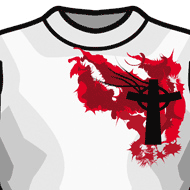 Well we just got back from the summer mission trip to Waterloo, Iowa last night, and even after a full night's sleep, I am bone-weary. It's a tough week for your average lazy suburbanite youth pastor -- sleeping on the floor, getting up way too early to take a communal shower, not getting any alone time, being away from my wife, always being on the go to handle situations or talk to people. Not that I'm complaining at all! God gives me 51 weeks at home, the least I can do is go outside of my comfort zone for seven measly days.
Well we just got back from the summer mission trip to Waterloo, Iowa last night, and even after a full night's sleep, I am bone-weary. It's a tough week for your average lazy suburbanite youth pastor -- sleeping on the floor, getting up way too early to take a communal shower, not getting any alone time, being away from my wife, always being on the go to handle situations or talk to people. Not that I'm complaining at all! God gives me 51 weeks at home, the least I can do is go outside of my comfort zone for seven measly days.It was a good trip, a great trip, and praise be to our Lord for that! The weather was good, the "drama" between the teens minimal, and all manner of problematic details worked themselves out splendidly. We did see God working in the hearts and lives of both the mission trippers who went (329 at this particular camp, 39 of them ours) and in the community we went to serve. My crew of six painted a house and garage for a very nice lady named Pat who was a social worker -- in effect, we ministered to a Christian lady who spends her every day ministering to others.
I looked for what God wanted to teach me this week, and I came away with a lot of thoughts and lessons on leadership. I don't know how inspiring of a leader I am -- some days I feel much more in the background than other, more popular and energetic leaders. But when we look at the Bible we see all types of leadership that Christ used to further the kingdom of God: the bold up front leadership of Peter, Andrew's skill in bringing others to Christ, the women's ability to provide support and funds to make the ministries possible. Some of us are called to just one of these roles, some are called to fit into different roles at various times.
I think a good leader is one who won't ever ask someone to do something they won't do themselves, someone who "walks the talk" in their lives. A good leader is always available to those who need an ear, a piece of advice or help. A good leader encourages those with leadership qualities to lead themselves, and he steps back to make this happen. A good leader isn't out to be an ego-driven self-centered populist, but someone who is okay with letting Jesus "steal" the spotlight and hearts of the teens.
We all like to be the center of positive attention, but there's a greater joy when you see young men and women put their faith and trust and adoration in a leader who will truly never let them down. It was humbling to see them kneel at the foot of the cross, to serve others cheerfully and without complaining, to uplift each other and make new bonds of friendship with churches several states away from their own.
Yeah, it was a good week. And I'm glad to be home.






